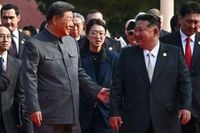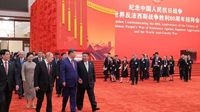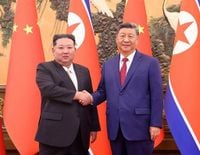Chinese President Xi Jinping and North Korean leader Kim Jong Un have reaffirmed their nations' longstanding alliance during a rare and highly symbolic meeting in Beijing, held on September 4, 2025. The summit, which took place at the Great Hall of the People, marked the first in-person talks between the two leaders in six years, underscoring a renewed commitment to mutual support and deeper cooperation amid a shifting international landscape.
The meeting followed a grand military parade in Beijing on September 3, commemorating the 80th anniversary of the end of World War II. The parade, attended by 26 foreign leaders—including Russian President Vladimir Putin—featured an impressive display of modern weaponry such as underwater drones, missiles, and laser arms, according to Chinese state media. The presence of Kim, Xi, and Putin at the event instantly drew global attention, fueling speculation about a possible united front against the United States and its allies.
During their talks, Xi emphasized the enduring nature of the China-North Korea relationship. According to a readout published by Chinese state broadcaster CCTV, Xi stated, "This position will not change regardless of how the international situation evolves." He further highlighted the "traditional friendship" between the two countries and pledged to consolidate and boost relations. North Korea's official Korean Central News Agency (KCNA) echoed this sentiment, reporting that both leaders discussed increasing high-level visits, strengthening strategic cooperation, and protecting shared interests in international and regional affairs.
Kim, for his part, expressed unwavering support for China. As reported by KCNA, he told Xi that "the friendly feelings between the two countries cannot change no matter how the international situation may change" and pledged that North Korea would "steadily develop the relationship and invariably support China in defending the sovereignty, territorial integrity and development interests of the state." This public declaration of loyalty comes at a time when Pyongyang's foreign policy has leaned heavily toward Moscow, raising questions about the future direction of North Korea's alliances.
Kim's visit to China was notable for several reasons. It was his first trip abroad in six years and marked the first time since taking office in late 2011 that he joined a gathering with such a large group of world leaders. Adding to the intrigue, Kim was accompanied by his young daughter, fueling speculation that she may be groomed as his eventual successor. According to multiple sources, Kim traveled to Beijing by his private train, departing for Pyongyang late on September 4 following his talks with Xi.
The joint appearance of Kim, Xi, and Putin at the parade did not go unnoticed in Washington. U.S. President Donald Trump took to social media, instructing Xi to "give his warmest regards to Putin and Kim as you conspire against The United States of America." However, Putin was quick to dismiss the notion of any conspiracy. During a news conference in Beijing, he remarked, "The President of the United States is not without a sense of humor," and insisted that no one had expressed anything negative about the Trump administration during his visit.
Despite the optics of unity, analysts caution against overinterpreting the significance of the Beijing summit. According to Zhu Feng, dean of Nanjing University's School of International Relations, "ganging up" with North Korea would damage China's international image, given North Korea's reputation as the world's most closed and authoritarian state. Zhu added that it should not be assumed that the China-North Korea-Russia relationship would see significant reinforcement, despite their joint appearances and shared grievances with the United States.
China has long been North Korea's most important ally, providing crucial economic aid and serving as its largest trading partner. The relationship dates back to the bloodshed of the Korean War in the 1950s, and Beijing has consistently advocated for stability on the Korean Peninsula. Yet, recent years have seen Pyongyang draw closer to Moscow, particularly since the onset of Russia's full-scale invasion of Ukraine. Kim has reportedly sent combat troops and ammunition to support Russia in exchange for economic and military assistance, a move that has reportedly caused some unease in Beijing.
North Korea's economy remains severely hampered by stringent U.S. sanctions tied to its nuclear weapons program. Some observers suggest that Kim's visit to China may also be an attempt to increase his leverage in potential negotiations with the United States. President Trump has repeatedly expressed interest in resuming diplomacy with Pyongyang, though talks have stalled in recent years. For China, encouraging North Korea to return to the negotiating table and abandon its nuclear ambitions remains a key strategic objective.
The Beijing summit also served as a reminder of the complex and often fraught dynamics between China, North Korea, and Russia. While all three countries are currently embroiled in separate disputes with Washington, they have yet to form a formal trilateral alliance. The spectacle of Kim, Xi, and Putin standing together at the parade may have been intended as a show of strength, but as the dust settles, the practical implications of their partnership remain uncertain.
For now, both Xi and Kim appear determined to project unity and resilience in the face of mounting international challenges. As Kim told Xi, the two countries' "friendly feelings" and mutual support are set to endure, regardless of how the world around them may change. Whether this renewed partnership will alter the balance of power in Northeast Asia—or simply reinforce old patterns—remains to be seen.



